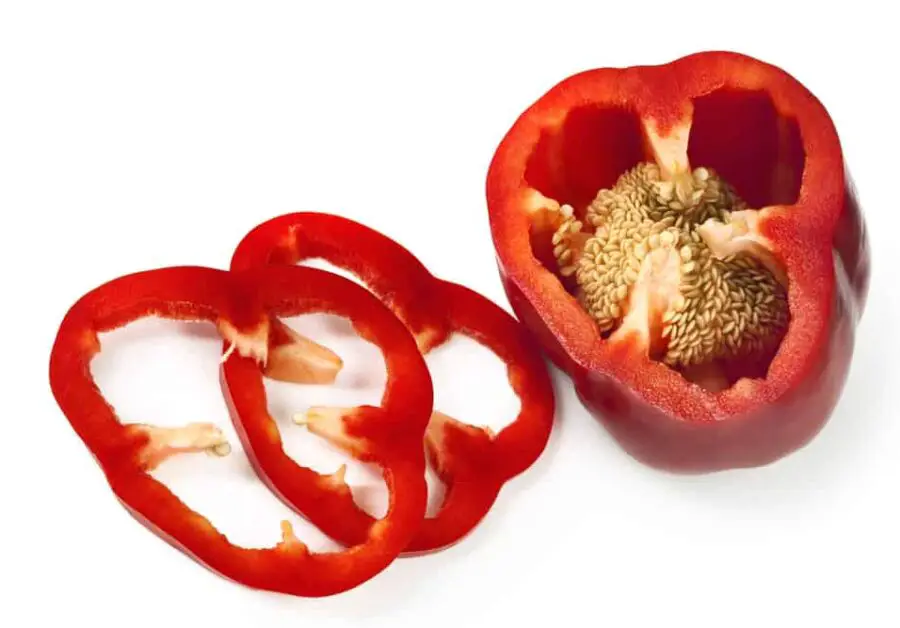We’ve all done it and thought nothing about it.
I know I have.
When you slice open a fresh bell pepper and prep it for a meal, what’s the very first thing you normally do?
You toss out the seeds!
Not just the seeds but the white spongy material lining the inside of the pepper, also known as the pith (or placenta).
But at the very least you’re curious if bell pepper seeds are edible, otherwise you wouldn’t be reading this article.
Right?
Well, here’s the answer.
Are you ready?
Yes, you can eat bell pepper seeds. There’s absolutely nothing to worry about – they are perfectly safe and, in fact, they can be healthy.
Whether you’ll want to, well, that’s a different matter. They have a taste profile that most people won’t like, which is the reason they’re not used in most recipes.
Are Bell Pepper Seeds Good For You?
The short answer is yes, they are. One study analyzed the nutritional content of bell pepper seeds and the pith (placenta).
They discovered the seeds were rich in several minerals including calcium, magnesium, zinc and iron, which are beneficial in supporting bone/tissue and enzymatic processes.
It wasn’t clear in the study the exact amount of seeds being studied, so it’s difficult to determine how much you would need to consume to get any health benefits, but when it comes to eating right, every little bit helps.
Are Bell Pepper Seeds Spicy?
Despite being classified as chili peppers, the most common variety of bell peppers, Heirloom, are not spicy and neither are their seeds. The reason for that is they lack capsaicin, which is what gives peppers heat. In the absence of capsaicin, no spiciness will singe your taste buds.
Peppers like these have been purposely produced to have a recessive gene that prevents capsaicin from being produced in the pepper. Mostly this is done to make them easier to eat and more tolerable for those with sensitive palates.
Rather, the bell peppers that most of us are familiar with are the furthest thing from spicy, especially when they’re perfectly ripe. They are crisp, mouth watering, and carry a hint of sweetness on the tongue.
Should You Remove Seeds From Peppers?
If you’re considering removing them out of fear of taking an unexpected tongue-sizzling bite, then put that fear to rest. As mentioned earlier, bell pepper seeds won’t make your meal spicy.
However, remove the seeds from your recipe if the mouthfeel and texture of the food is a concern. For example, if you’re making sauces (other creamy-textured foods), then eliminating the seeds will help with the consistency.
After all, the last thing you want to do is slave over a meal only to have seeds everywhere.
Removing the seeds is very simple.
Begin by slicing off the top of the pepper and removing it. Using a teaspoon, dig inside the pepper and dislodge the pith and the seeds. Once they’ve come loose, simply scoop them out. Be sure and hunt around for those last stubborn bits!
Your pepper is ready to use. Slice it. Dice it. Mince it. Whatever you want!
Are Bell Pepper Seeds Dangerous?
No, bell pepper seeds are not dangerous.
They are safe to eat, if that’s something you want to do, and as mentioned in an earlier part of this article, the seeds of bell peppers contain valuable minerals like zinc and iron, among others.
Can You Cook Bell Pepper Seeds?
Again, that comes down to personal preference and your willingness to experiment with food.
However, most will find the taste of the seeds quite unpleasant – they can be earthy and bitter. Once cooked, the taste doesn’t change much and you may find them difficult to chew. They may also get stuck between your teeth or on the back of your throat when you swallow.

Hi, I’m Jenny. I have many interests and, some would say, eclectic passions. A few words that best describe me? Hmm, well… Amateur surfer, professional traveler, food lover and writer extraordinaire. Oh, and lover of all furry, four-legged creatures!

